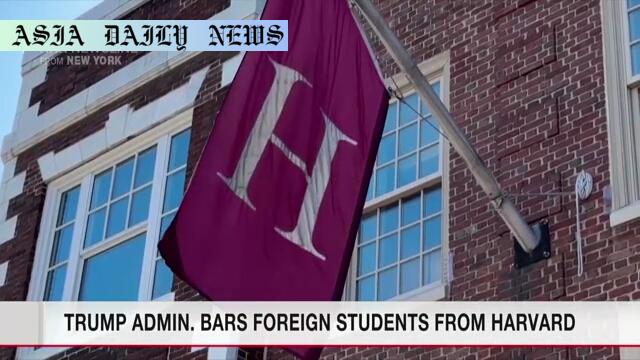Harvard responds to unlawful ban threatening its academic mission due to accusations from the Trump administration.
- Harvard has been barred from enrolling foreign students by the Trump administration.
- Secretary Kristi Noem accused Harvard of antisemitism and ties to the Chinese Communist Party.
- Harvard considers the decision unlawful, stating it harms academia and US interests.

Trump Administration’s Ban on Harvard Foreign Students
The Trump administration has recently issued a controversial order barring Harvard University from enrolling foreign students. This unprecedented move also mandates current international students at Harvard to transfer to different institutions or face the risk of losing their legal status in the United States. The mandate stems under the directive of Homeland Security Secretary Kristi Noem, marking a significant escalation in institutional relations between the federal government and the academic community.
Allegations Against Harvard and Their Implications
Secretary Noem accused Harvard of fostering violence and antisemitism and claimed the university had affiliations with the Chinese Communist Party (CCP). These accusations were paired with an overarching warning to other universities about facing similar bans if deemed noncompliant. Such allegations have exacerbated tensions between the administration and higher education institutions, amplifying concerns over academic freedom and educational stability. The suggested ties to CCP, paired with criticisms of antisemitic culture, have added a political dimension to the issue, stirring widespread debate within government and public circles.
Harvard’s Outrage and Legal Stand
In an official response, Harvard described the ban as “unlawful” and claimed it poses severe threats not just to its academic and research missions but to the broader fabric of American higher education. The university emphasized the critical role international students play in fostering innovation, cross-cultural exchange, and global collaboration. It expressed concerns about the long-term ripple effects this move might have on the United States as a hub for world-class education and research. Furthermore, this latest conflict follows earlier efforts by the Trump administration to freeze part of Harvard’s funding, where similar accusations of failing to combat antisemitism were levied. Harvard responded to the funding freeze with a lawsuit, highlighting the strained relations between the institution and the federal government.
Broader Consequences and Global Perception
The ban on international students at Harvard is not an isolated case but part of a broader political stance towards higher education and immigration policies under the Trump administration. Experts warn that such decisions could tarnish the global perception of American universities as inclusive, world-class institutions. The ripple effects extend far beyond Harvard, potentially discouraging international students from pursuing education in the U.S. This decline could impact U.S. academic competitiveness, reduce cultural diversity on campuses, and hinder critical international collaborations in research and development. As universities like Harvard stand at the crossroads of politics and diplomacy, questions loom about the governance of academic institutions and their autonomy in the face of mounting political challenges.



Commentary
Concerns Surrounding the Ban on Harvard’s Foreign Students
The recent decision to bar international students from enrolling at Harvard University raises serious concerns about the shifting dynamics between academia and politics. The Trump administration’s directive, led by Homeland Security Secretary Kristi Noem, seems to challenge the foundational values of America’s higher education system as a beacon for global talent and innovation. Such a move not only threatens Harvard’s cultural and academic diversity but also sends a worrying signal to international students aspiring to study in the U.S.
Preserving Academic Freedom and Autonomy
Academic institutions have long been places where diverse ideas thrive, fostering creativity, collaboration, and breakthroughs across disciplines. By targeting Harvard and labeling it as a hub fostering antisemitism and Chinese Communist Party affiliations, the administration risks undermining public trust in academic institutions. These allegations, while serious, must be approached with transparency and evidence, rather than sweeping declarations that threaten the academic missions of world-class universities. Such decisions can set a dangerous precedent where politics increasingly encroaches upon the independence of academic decision-making.
The Broader Implications for U.S. Higher Education
This ban does not merely affect Harvard; it casts a shadow over the reputation of all U.S. universities. International students contribute significantly to research programs, diverse perspectives on campuses, and the U.S. economy through tuition and living expenses. Removing such a vital component could weaken the country’s standing as a global leader in education. Moreover, it sets a troubling tone for how the U.S. government views its intellectual institutions—as political battlegrounds rather than pillars of progress and innovation. As the situation unfolds, one can only hope for a resolution that upholds academic integrity, national interests, and the freedoms that underpin the American educational system.